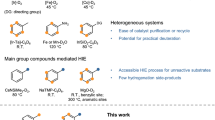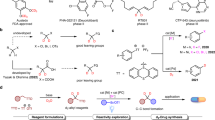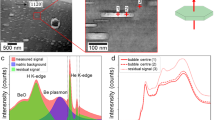Abstract
THE heterogeneous equilibria between hydrogen and the metallic chlorides have been extensively studied, notably by Berger and Crut1 using a static method, and by Jellinek and his collaborators2 using a dynamic method. More recently, Kapustinsky3 has studied the reduction of cuprous chloride with both hydrogen and deuterium, using a static method. The agreement among the results of different authors is not very satisfactory and we are engaged in further investigations of heterogeneous equilibria involving hydrogen and deuterium.
This is a preview of subscription content, access via your institution
Access options
Subscribe to this journal
Receive 51 print issues and online access
$199.00 per year
only $3.90 per issue
Buy this article
- Purchase on SpringerLink
- Instant access to full article PDF
Prices may be subject to local taxes which are calculated during checkout
Similar content being viewed by others
References
Berger and Crut, C. R., 173, 977 (1921).
Jellinek and Uloth, Z. phys. Chem., 119, 161 (1926); Jellinek and Rudat, Z. phys. chem., 143, 244 (1929).
Kapustinsky, J. Amer. Chem. Soc., 58, 460 (1936).
Urey and Rittenberg, J. Chem. Phys., 1, 142 (1933).
Author information
Authors and Affiliations
Rights and permissions
About this article
Cite this article
PARTINGTON, J., TOWNDROW, R. Heterogeneous Equilibria with Deuterium. Nature 140, 156 (1937). https://doi.org/10.1038/140156a0
Issue date:
DOI: https://doi.org/10.1038/140156a0



